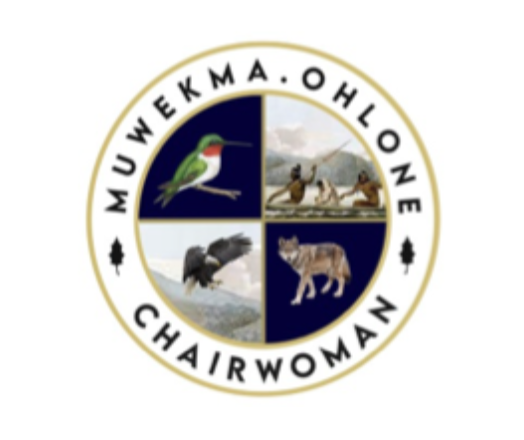The Muwekma Ohlone Tribe of the San Francisco Bay called upon Interior Secretary Deb Haaland (Laguna Pueblo) this week to make the National Eagle Feather Repository, maintained by the Fish and Wildlife Service Department of the Interior, accessible to the Tribe. Current published policy guidelines prevent faithkeepers of the Tribe from acquiring Eagle Feathers for religious and spiritual use.

Chairwoman Charlene Nijmeh wrote in a letter to Haaland that the federal policy violates the United Nations Declaration on the Rights of Indigenous People (UNDRIP) and should be changed.
“Our religious practices and many of our ceremonies require these feathers, and preventing our access to them would be a continuation of the federal government’s longstanding policy objective of eradicating us,” Nijmeh wrote in the letter.
Eagle feathers are needed to conduct many of the Tribe’s ceremonies. Eagle feathers symbolize what is highest, bravest, strongest, and holiest. These feathers have strong medicine for Indigenous people. The eagle is a highly protected creature under U.S law, but exceptions are made to allow Native Americans to possess their feathers within specific conditions. According to the U.S Fish and Wildlife Service, only enrolled members of federally recognized tribes can apply to possess eagle feathers from the Repository for religious purposes.
The Muwekma Ohlone Tribe was previously federally recognized and has never been terminated by an act of Congress.
The Muwekma Ohlone Tribe was wrongly excluded from the Bureau of Indian Affairs 1978 list of officially recognized Tribes, and have been struggling for more than 40 years to affirm federal status. Tribal members descend from that previously recognized Tribe. A seven year Stanford University genomic study linked the Tribe’s ten core lineages to a 2,000 year old burial ground on their homelands in California.
In 2022, a federal district court judge in the Northern District of California found that the Muwekma Ohlone Tribe retains its sovereign immunity despite being wrongly excluded from the Bureau of Indian Affairs list of recognized tribes.
“This is no small injustice. It is a deep and painful assault against us, intended to prevent us from practicing our traditions and keeping sacred ceremonies alive. This policy is just one small policy of the thousands of federal policies that were architected to destroy our People and assimilate us out of existence. It’s an offense of the highest order, and it’s akin to Gov. Peter Burnett’s state-sponsored bounties on our heads,” Nijmeh said in the release.
Indian Country has an enormous amount of hope for justice invested in Haaland’s historic tenure leading the Interior Department. The department includes the Bureau of Indian Affairs and also has control over federal lands, natural resources, and the environment.
Next May, Nijmeh and members from her Tribe are planning a three month long journey across the United States by horseback from California to Washington D.C. The journey will culminate at the U.S Capitol where she will demand justice from Congress and the Biden Administration.
“Our ancestors fought too hard to survive so that we could be here. For us to sit silently and continue to endure the same policies of eradication from this administration would be unconscionable. We have an obligation to future generations to have a forward posture when it comes to the assertion of our sovereignty and the survival of our people,” Nijmeh concluded in the release.
More Stories Like This
Chickasaw Lighthorse Police Officer named Indian Country Law Enforcement Officer of the YearIndian Gaming Association Rallies Broad Coalition Against Sports Event Contracts It Calls Illegal Threat to Tribal Sovereignty
Navajo Resources and Development Committee Issues Notice on Livestock Inspection Requirements
American Prairie, Tribal Coalition Files Protest Over Rescinded Grazing Rights
Northern Cheyenne Push Back Against Trump Administration’s Effort to Alter Little Bighorn History
Help us defend tribal sovereignty.
At Native News Online, our mission is rooted in telling the stories that strengthen sovereignty and uplift Indigenous voices — not just at year’s end, but every single day.
Because of your generosity last year, we were able to keep our reporters on the ground in tribal communities, at national gatherings and in the halls of Congress — covering the issues that matter most to Indian Country: sovereignty, culture, education, health and economic opportunity.
That support sustained us through a tough year in 2025. Now, as we look to the year ahead, we need your help right now to ensure warrior journalism remains strong — reporting that defends tribal sovereignty, amplifies Native truth, and holds power accountable.
 The stakes couldn't be higher. Your support keeps Native voices heard, Native stories told and Native sovereignty defended.
The stakes couldn't be higher. Your support keeps Native voices heard, Native stories told and Native sovereignty defended.
Stand with Warrior Journalism today.
Levi Rickert (Potawatomi), Editor & Publisher

